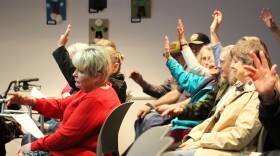It's minutes before the day’s first lunch customers show up at the Soldotna Senior Center. Kitchen staff expect lunch to be busier than normal, which is common at the start of the spring. That’s when snowbirds begin arriving on the central Kenai Peninsula.
Soldotna Senior Center Executive Director Lisa Riley says during peak summer months, the center sees anywhere from 10 to 20 more in-house meals served a day.
“It's much busier around here," Riley said. "We did just recently hire one additional staff member for the office to try to keep up with some of that.”
Riley says other senior center services, like home delivered meals and exercise classes, see similar increases because of snowbirds.
“And we utilize a very strong volunteer base,” she said.
Volunteers, who are often snowbirds themselves, are the backbone of running the senior center in the summer. Some also financially support the senior center through donations, which Riley says are crucial after it lost state and city funding in 2023 amid financial mismanagement. It’s since had to pull money from its reserves, and last month asked the Soldotna City Council to reinstate its funding.
Riley says the senior center has become partially dependent on monthly fundraisers, which help pay for services year round.
“No matter how many seniors we're serving, no matter what the inflation rate is, our funding doesn't increase to match that, and so we're constantly trying to figure out ways to make ends meet,” Riley said.
Like the Soldotna Senior Center, the Kenai Senior Center sees an influx of clients, including snowbirds, in the spring and summer. It serves about 250 clients a month in the winter, but Kenai Senior Center Executive Director Kathy Romain says their client base increases by about 150 in the summer.
“January, February and March have been a little slow when it comes to in-house dining, and part of that is the weather," Romain said. "So we're used to a little bit of slower gear, and then it really picks up. By May, we're in full bloom.”
Similar to other senior centers, the Kenai Senior Center offers in-house and home delivered meals, exercise classes and other services. The center is primarily funded by federal, borough and city grants.
Seniors also have the option to donate to the Kenai Senior Center directly. Romain says the center’s increase of clients in the summer means an increase in the number of donations received.
“Most people who travel in and out are probably middle to upper income, and so they can afford donations that they give toward their meals," Romain said. "So we do see an increase of donations in the summertime.”
Romain says this benefits the senior center year round, because not all seniors can afford to pay the suggested donation for its meals. Riley, at the Soldotna Senior Center, says the donations they receive are equally beneficial.
And, Riley says snowbirds financially support more than just the senior centers of the Kenai Peninsula.
“It's more people coming in. They're financially supportive of our community," Riley said. "They’re shopping local. They pay their property taxes, they come in here."
Just like the Kenai and Soldotna senior centers, representatives of the Nikiski and Sterling senior centers say they see similar client increases in the summer as a result of snowbirds.




